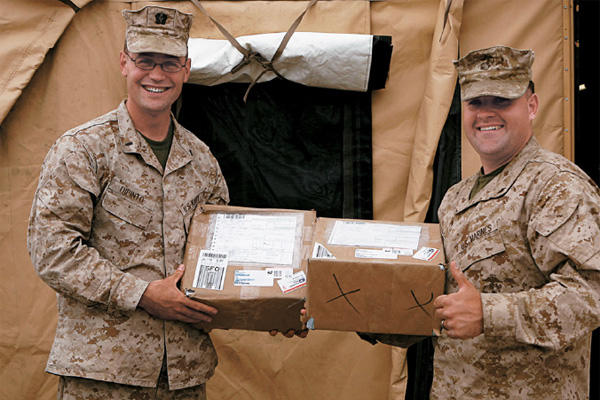Receiving mail and care packages is a terrific morale booster for your service member son or daughter. You can never send too many—especially letters. Your service member will always be happy to get mail from you, and this can also make you feel better by knowing that you are "doing" something that helps your son or daughter, even if it is purely on an emotional level. Sending frequent mail not only keeps your service member's spirits up, but also helps maintain a bond of closeness between you, despite the thousands of miles that actually separate you.
"I was always there when he was able to call, twenty-four hours per day. I let him talk about whatever he wanted to, whether it has to do with his deployment or not. I tried not to ask questions about deployment unless he brought the subject up. I always told him how much I love him, miss him, and how I am so very, very proud of him."
—Army parent
This bond is important, because the last thing you want is for your service member to return from combat feeling as though everyone she ever loved is now a stranger. Maintaining contact during the deployment is one way that loved ones can make those feelings less likely to surface—or if they do, less powerfully.
Patience can be an important virtue for extended family and friends during this time. If your service member is married or has children, you may notice that he's focusing a lot of energy communicating with his spouse and children. Chances are good that your service member hopes that you'll check in on his immediate family to make sure they're doing well in his absence, and also hoping that the immediate family is keeping you up-to-date on how he's doing. However, if the lines of communication are not optimal between the immediate family and you, don't take that issue up with your service member while he's in a combat zone. Instead, follow up with the family in person, if possible. Potentially, because of a move associated with this deployment, the family might lack a local support network, and therefore you can be a vital resource of strength and support for your service member's family.
Don't be surprised if your service member is not able to communicate as much as you would like. Very often, service members bond with their team members while in combat. This bonding actually keeps your service member safe by improving unit cohesion and promoting resilience.
When you do speak with your service member, focus on relaying positive and supportive messages.
Tips for Communicating Through Social Media on Deployment1. Reach out to military support organizations on or near your base for information on social events, pre- and post-deployment briefs, unit and DoD updates, and special offerings. Check with your family readiness officer (FRO) or family readiness group (FRG) to ensure you are accessing the appropriate pages or websites. 2. Stay in touch with close family and friends and keep them updated on how well you are handling the deployment. Don't be afraid to toot your own horn! 3. Review your privacy settings and stay aware of your personal online security. 4. Think twice before you post or tweet about your personal life or your relationships. 5. Take advantage of social media platforms if you are looking for a new job. Sites like LinkedIn, Monster, and the Military Spouse Employment Partnership are ideal resources whether you are launching a new career, improving the one you have, or looking to network for a future position. 6. Stay physically and mentally healthy. Turn off the electronics and take a walk or head to the gym at least a couple of times each week. |
This excerpt is provided courtesy of the acclaimed free digital resource "Everyone Serves." Download your free copy with additional media content today at everyoneservesbook.com.



















